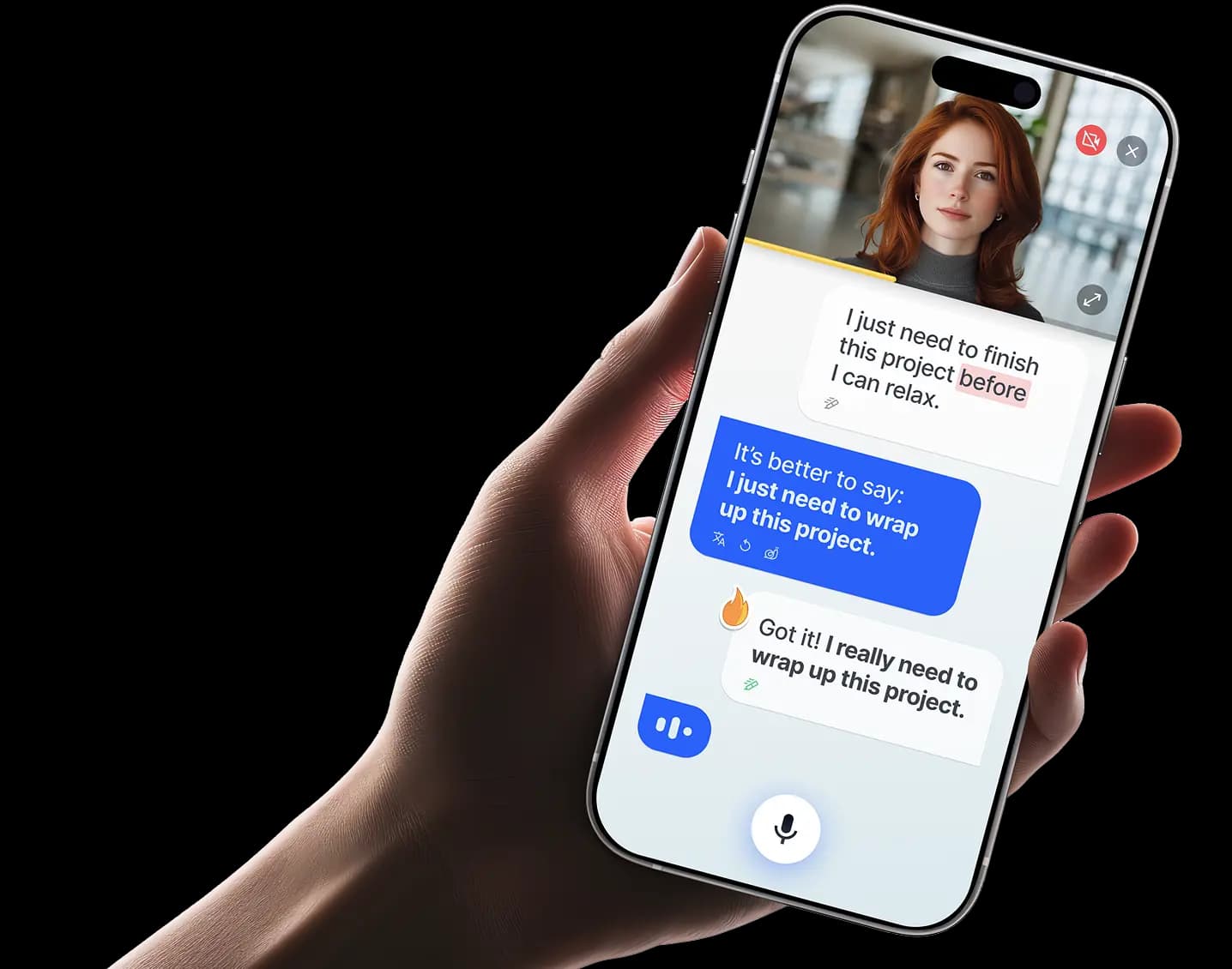Top English Conversation Questions for Personalized Practice

Want to actually get better at speaking English without memorizing boring phrases? Then, you need questions that fit you. Generic conversation prompts won't get you far, as you need a practice that feels natural, personal, and actually fun. That’s where this guide comes in.
In this article, you’ll find a carefully picked list of English conversation questions tailored to different interests, situations, and goals. They’ll come in handy for situations like getting ready for a job interview, planning a trip, or just wanting to hold smoother everyday conversations. These prompts will help you speak more confidently, more naturally, and way more like yourself.
Key takeaways
The following are the key takeaways from this guide:
- Conversation is key to learning English. The more you speak in an ESL discussion, the more confident and fluent you become.
- Most learners struggle with speaking, not grammar or vocabulary. It’s the fear of making mistakes or sounding “wrong” that holds people back.
- Practice with purpose. Using varied, real-world conversation questions helps you prepare for actual situations, from job interviews to casual chats.
- Loora transforms your practice. It gives you a safe, always-available space to speak English freely, get instant feedback, and grow at your own pace.
The challenges of finding effective English conversation practice
Most traditional ways of practicing English conversation are redundant by today’s standards.
You sit in a classroom, memorizing phrases you'd never say in real life. Or you join a language exchange, only to spend half the time waiting for your turn and the other half wondering if your partner's correcting you out of kindness or honesty.
Sound familiar?
The truth is, practicing real English, the kind people actually speak, is hard to come by. Classes are expensive. Tutors aren’t always available when you need them. And free online apps? They often teach stiff, robotic phrases that don’t help in real conversations.
That’s where Loora changes the game. It’s an AI-powered English coach that lets you practice from home or anywhere else, with real-time feedback that actually helps you improve.
There is no judgment, no scheduling, just real, one-on-one practice built around conversational questions. Loora was designed to make fluent English feel accessible, personal, and even enjoyable. Finally, conversation practice that fits into your life, not the other way around.
Varied English questions to practice fluency in real-world scenarios
If you only practice English by answering the same boring “What’s your name?” or “Where are you from?” questions, you’ll hit a wall fast.
Real life doesn’t stick to a script. That’s why it’s so important to mix things up and practice with different types of questions in English. When you train with a variety of topics such as hobbies, travel, and work, you build confidence in different situations, from job interviews to small talk at a coffee shop.
Below is a list of ESL conversation questions grouped by real-world topics, plus tips on how to use them in your daily practice.
Everyday conversations
These English questions help you become comfortable with casual English, the kind you'd use with friends, family, or strangers.
Examples:
- What do you usually do after work?
- What’s your favorite way to spend a weekend?
- Do you prefer tea or coffee, and why?
Usage tip: Practice answering these out loud in different moods (tired, excited, casual). Real life isn’t always calm and clear.
Travel and culture
These ESL questions build vocabulary and confidence for global conversations.
Examples:
- What’s one place you’ve always wanted to visit?
- How is your hometown different from other cities?
- Have you ever experienced culture shock?
Usage tip: Use these to role-play being at an airport, hotel, or chatting with a fellow traveler.
Work and career
Perfect if you're preparing for interviews or improving business English.
Examples:
- What’s a project you’re most proud of?
- How do you handle deadlines?
- What’s your dream job, and why?
Usage tip: Recording yourself answering and listening back helps you catch filler words like “uh” or “like.”
Opinions and experiences
Great for building depth in your conversations.
Examples:
- What’s the best advice you’ve ever received?
- Do you think technology makes life better or worse?
- What’s something you’ve changed your mind about recently?
Usage tip: Try expanding your answers. Don’t stop at one sentence. Tell a short story if you can.
Creative and "out there."
These conversation starters help you think fast and get playful with language.
Examples:
- If animals could talk, which one would be the rudest?
- What would you do if you had one day with no rules?
- What would you invent if you had unlimited money?
Usage tip: Don’t worry about perfect grammar here. Just have fun. Fluency comes when you stop overthinking.

Overcoming fear and building confidence in speaking
Here are simple and effective ways to manage your fear and build real confidence when speaking English:
Talk even when it’s messy
If you wait until your English is perfect, you’ll never start speaking at all. Mistakes are part of learning. Virtually every fluent speaker you admire once made the same pronunciation errors. So speak now. Use the words you know.
Even if you mix things up or say something wrong, you’re still learning. Most people will be patient, and many won’t even notice your mistakes. The more you speak, the faster you’ll improve.
Choose one topic a day. Try talking about it out loud for two minutes without stopping to correct yourself.
Record yourself speaking
It is one of the most powerful tools you can use. It helps you hear how you really sound and notice patterns in your speaking. You'll start catching little things, like how often you pause or repeat a word.
Over time, you'll also notice improvements in how smoothly you speak and how natural you sound. Use your phone to record yourself answering one question per day. Then, listen back and write down one thing you did well and one thing you want to improve.
Use a private space to warm up
Before you speak English with someone else, warm up by speaking alone. It’s just like warming up before a session in sports. Practicing alone first gets your brain and mouth ready. That makes it easier to think clearly and speak more smoothly when you're in real conversations.
Here's an idea for you: stand in front of a mirror and say a few phrases like "How are you today?" or "Here’s what I’m doing this week." This will help you build muscle memory and feel more comfortable using English in public.
Change the story in your head
Fear often starts in your thoughts. Don't think, "I'm going to mess this up." This will make you feel nervous before you even open your mouth. Rather, train yourself to think, "This is just practice," or "It's okay if I make a mistake." This choice will make you feel more relaxed. Remember, your mindset directly affects how you speak.
Before every conversation or practice session, say one kind thing to yourself. It could be, “I’m trying, and that’s what matters," or "Each mistake helps me get better.”
Celebrate tiny wins
You don't need to give a perfect speech to feel proud. Maybe you said hello to someone in English today, or maybe you answered a question without pausing too long. These are wins. Celebrate them. Noticing progress builds motivation. It helps you feel like you're moving forward instead of getting stuck.
You can keep a small journal. At the end of each day, write one sentence about what went well in your English practice. It’s a simple habit that reminds you how far you’ve come.
Revolutionize your English practice with Loora
Most English learning tools stop at the surface. They give you vocabulary lists, grammar tips, or short reading exercises. But that's not enough. You don't just need more information; you need real practice. And that's exactly where Loora changes the game.
Loora isn’t just another language app. It’s your personal English coach. You can talk to it anytime. It listens, responds, corrects you, and helps you grow with every sentence you say.
You don't need to schedule a lesson or wait for a tutor. You don't need to feel nervous about making mistakes in front of someone. With Loora, you get unlimited speaking practice on your terms in your own time. That removes one of the biggest barriers to fluency — the fear of speaking out loud.
If you've struggled with building fluency, staying consistent, or finding the right partner to practice with, Loora is the solution that finally makes it possible to learn English and live it.
FAQs
What do most ESL students struggle with?
Most ESL students struggle with speaking and confidence. Understanding grammar or vocabulary is one thing, but speaking out loud without fear is another.
Many learners worry about making mistakes, speaking too slowly, or not knowing the right words. That’s why regular speaking practice is so important, even after studying a grammar course or doing an exercise. The more you use English, the easier it gets.
What are the big questions in English?
Big questions are deep or meaningful topic questions. They usually make you think and share your opinions or feelings. These are great for practicing longer answers and learning how to express ideas clearly.
Here are a few examples:
- What does success mean to you?
- What do you think makes a good life?
- If you could change one thing in the world, what would it be?
What are fun conversation questions for ESL adults?
Try these:
- If you could travel anywhere, where would you go?
- What’s your favorite food, and why?
- Would you rather be able to fly or become invisible?
They’re simple conversation questions for kids and adults alike, but they help you speak freely and get creative with your answers.
What are some fun, open-ended questions in English?
Typically, open-ended conversation questions don't have a "yes" or "no" answer. They invite longer responses, which makes them perfect for practice.
Below are some examples:
- What’s the best memory you have from childhood?
- How do you usually spend your weekends?
- What are the skills you’d love to learn, and why?
It’s good practice to use open-ended language learning questions to stretch your vocabulary, build fluency, and keep the conversation flowing.
Engage in personalized conversations with Loora, the most advanced AI English tutor, and open doors to limitless opportunities.
